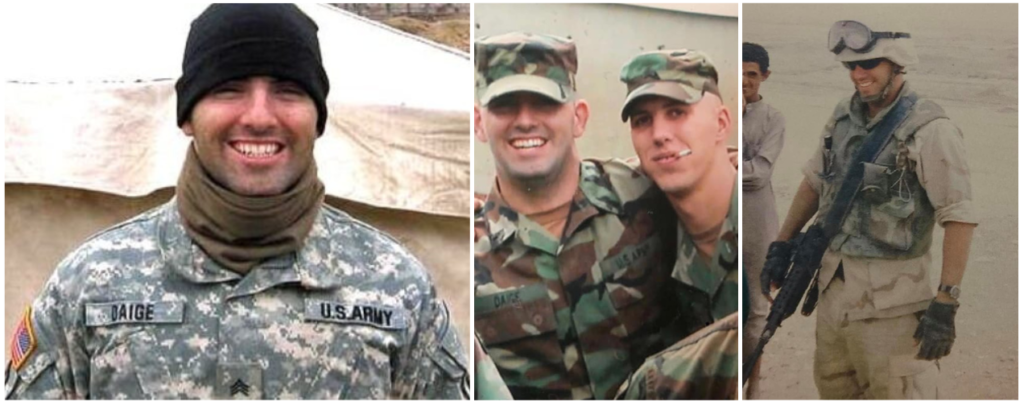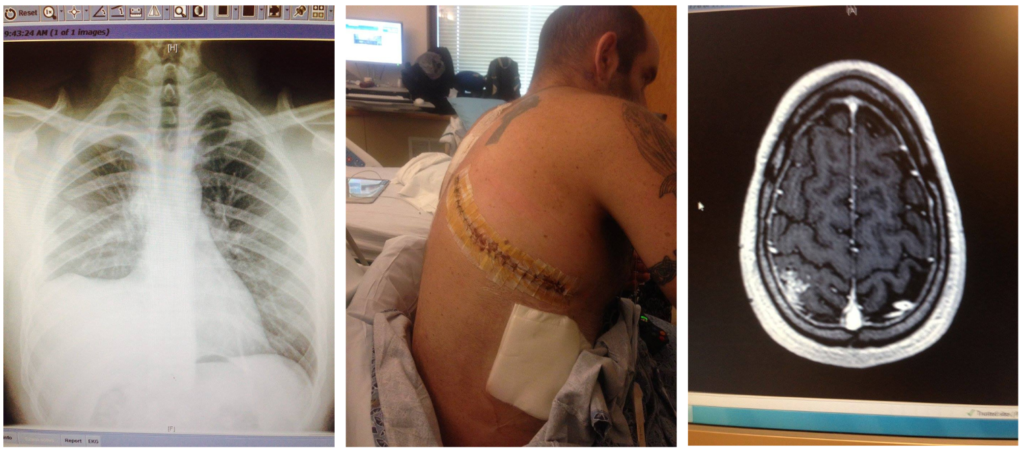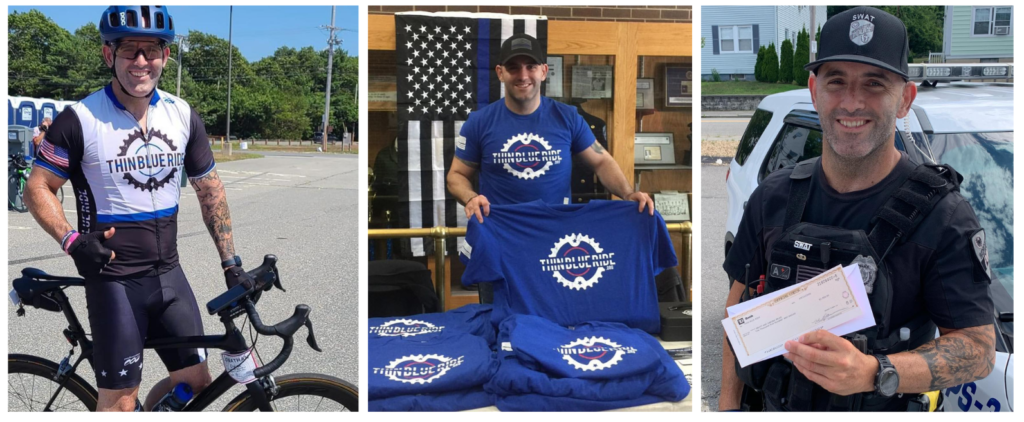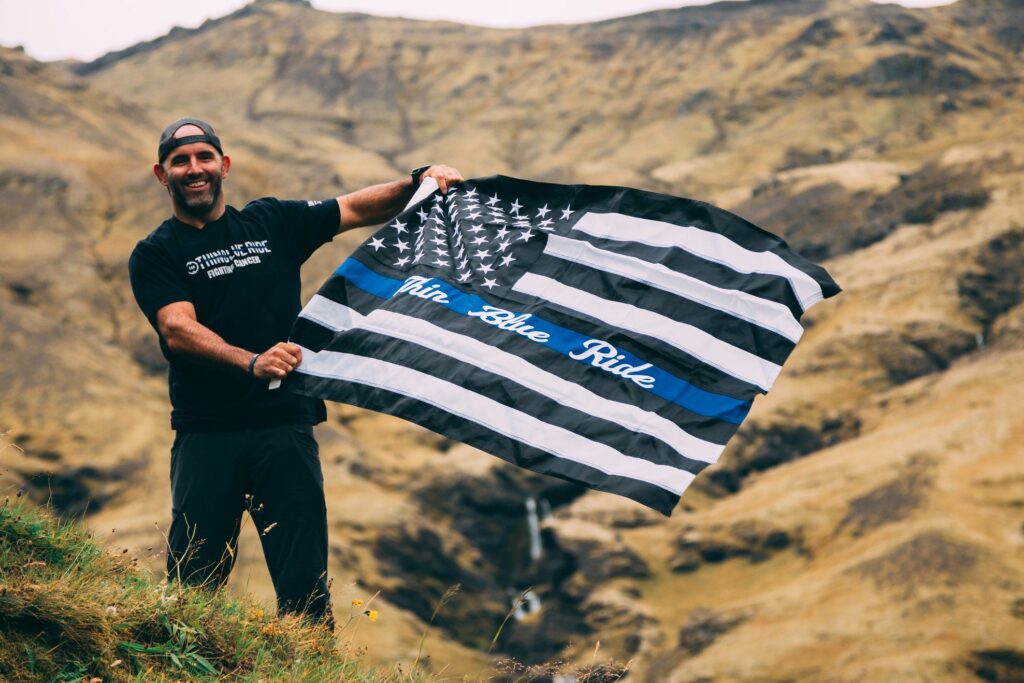April 3, 2023
Jonathan Daige, better known as “JD” is a fighter. A true Bostonian at heart, he is used to winning and it shows as he has been through hell and back more times than we can count. We met JD a few years ago and immediately hit it off. He is your typical freedom-loving Patriot who has dedicated his life to serving, whether it be in the [hideous] Army Combat Uniform (ACU) or his dress uniform as he is a member of the Worcester Police Department – JD has the intent of keeping others safe, even if it means putting himself in the “line of fire”.

“In 2003, I was deployed to Iraq with the Army. During down time on base I lifted weights quite regularly. When I woke up with severe pain in my groin, I assumed that I had pulled something while working out and didn’t think much more of it. When the pain persisted, I realized that this was not normal for me, but I continued to brush it off for six months until it became so severe that I decided to see a doctor. I was diagnosed with a hernia and had surgery in between my first and second deployment (again to Iraq).
Flash forward almost 10 years later. I was 29 years old and employed as a police officer in Worcester, Massachusetts. I did night patrol on one of the busiest streets—I really enjoyed this beat and appreciated the opportunity to stay busy and keep the neighborhood safe.
I began to experience pain in my groin again, but this time it was… different. The pain was much more intense and I noticed that one of my testicles was getting bigger. I also felt like I had a head cold which was lasting longer than usual. When you’re in the military, the general mindset is to “fight through the pain,” so that is what I did.
This approach landed me in the emergency room just a few weeks later.
The team at the hospital ran a number of tests including an ultrasound. The doctor then informed me that I had a “mixed germ cell tumor” —testicular cancer. While the news was shocking, I was quickly scheduled into surgery to remove the tumor. After the tumor was removed, I was relived, I took a deep breath, and I thought that my cancer troubles were over.
As I healed and began running again, I noticed that I was wheezing. It was a subtle change in my health, so I pushed through it for several weeks until I began to cough up blood. This was a huge red flag so I went to the doctor right away. Test results came back revealing that the cancer we thought was in remission had spread into my chest and lungs where six tumors were discovered.
The medical team wanted to delay treatment, which did not sit well with me, so I sought a second opinion at Dana Farber Cancer Institute in Boston, under the discretion of oncologist, Dr. Chris Sweeney. I am so glad that I did because the next doctor insisted on starting chemotherapy treatment immediately. I’m positive that this made a major difference in putting my cancer back in remission and the reason why I am alive today.
The cancer has come back a few times and I’ve had a total of 10 operations over the past several years, including two brain surgeries and getting a third of my right lung and 10% of my left lung removed. Because I acted fast each time I noticed a change, I am still alive. My advice to people who read my story is: If you notice a change in your health that feels abnormal or unusual and doesn’t improve after two weeks—call your doctor right away.
I have had two careers where being tough and brave can be life-saving, but when it comes to your health, don’t tough it out—call your doctor and share as much information as you can. You know your body best and are the most important member of your healthcare team…”.

Despite facing death in combat, twice, and remaining on alert while patrolling as a police officer, JD had to continue fighting, continue being vigilant even in the safety of his own home. Against all odds, JD decided he would find a way to give back. Admitted immediately to the hospital for the second time to begin lifesaving treatment, his oncologist, Dr. Chris Sweeney of DFCI had a stationary bike placed within his room to prevent him from “going crazy from sitting around and doing nothing all day“.
JD said “I would hop on the bike to keep the blood flowing. I always feel better when I do some sort of workout. I was hooked up to chemo for eight hours a day for five days a week. Once the chemo was done I would go home for two and a half weeks then return for more treatment. This went on for five sessions. I was able to keep active in between sessions. The first few days after chemo were really tough but after that I would get out of the house, go to the movies. By the second week I would go to the gym, do Crossfit, wakeboard, play golf, hockey. As you can tell I don’t like to sit around and do nothing. I bought an entry level road bike because I knew my lungs wouldn’t be the same as before….”.
Three years into his treatment and while in his “recovery phase”, Dr. Sweeney mentioned the Pan-Mass Challenge, or PMC. The PMC is unique to Massachusetts and is the biggest cancer-related fundraiser in the state. It is a two-day 190-mile bicycle ride from Sturbridge, MA to Provincetown, MA in which funds raised support Dana Farber Cancer Institute. JD immediately knew he wanted to get involved, more so to be able to give back to so many in need.
He completed two Pan-Mass challenges and raised an abundance for Dana Farber, but he noted that others in the military, including his close friend, Army Sgt. Jonnathon DuClau (pictured above, middle photo, right) that he deployed with who unfortunately passed away at 34 years old from liver cancer in January 2019. JD wanted to help those closer to him who faced similar battles, in turn he created the nonprofit organization, “Thin Blue Ride“, where he continues to ride for Pan-Mass, but also raises money and funds to support fellow first responders and military veterans diagnosed with and battling cancer. We can say, any time we’ve asked JD for help with a service member or veteran, he has come through, even when we haven’t asked – JD is always there, with a smile, extending a hand of support and a ear to listen.
In November 2021, JD sent us a text saying he was just diagnosed with a refractory form of leukemia, most likely as a result from his past chemotherapy cancer treatments. While he is “stable”, he will still need to remain on medication for the remainder of his life. He will have days of severe fatigue, weakness, but knowing JD, he will not let it get him down.
Visit: www.ThinBlueRide.org – and check out their events and the great work they do for the community on their social media channels: @ThinBlueRide on IG and FB

